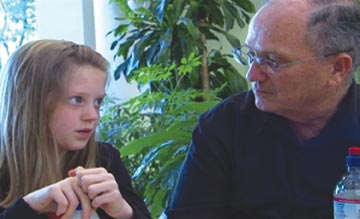Interview with Dr. Pam Burton, Siemens Hearing Instruments, & James Cudo
Share:
Topic: Educating the Public on Hearing Health

Dr. Pam Burton
DR. CAROLYN SMAKA: Today we have two guests, James Cudo, a retired Cleveland police officer and consumer of hearing aids, and Dr. Pam Burton, the Director of US Product Management at Siemens Hearing Instruments. We'll be discussing Mr. Cudo's experiences with hearing aids, and Siemens new consumer education initiatives. Thank you both for joining me today.
JAMES CUDO: Thank you for having me.
DR. PAM BURTON: Thank you, Carolyn;it's always a pleasure to speak with AudiologyOnline.
SMAKA: I'll start my questions with Mr. Cudo. Research shows that when people first notice a hearing loss they typically wait years before they seek a solution such as hearing aids. What motivated you to get hearing aids for your hearing loss?
CUDO: Well, my wife had been telling me for a number of years that I had a problem. I also have an 11-year-old granddaughter. She pretends to be a teacher and puts me in little classroom situations. Before, I often could not hear her and I was always asking her to repeat things. This led me to eventually seek more information and receive a hearing test.

James Cudo and granddaughter, Courtney
SMAKA: What has changed in your life since you received your hearing aids?
CUDO: I've seen improvements in my relationships. I do not have to ask my wife or my granddaughter to repeat things. Before my hearing aids, I was not part of many of the family conversations going on;I would just sit there because I couldn't follow them. I'm part of the conversations now.
I feel so good about myself now and can hear so much better with my hearing aids that I want to be able to help others that are now in the position I was in years ago, before I treated my hearing loss. That's why I agreed to share my story as part of Siemens new consumer education campaign. I want to be able to help others hear better by telling about my experiences, and motivating them to do something about their hearing problem.
SMAKA: What advice do you have for other people that are facing hearing loss and might not be ready to do something about it?
CUDO: I would advise them to definitely receive a hearing test. If hearing aids are recommended, don't put it off because they will only help in the long run.
The hearing test is very simple. My audiologist asked me to sit in a soundproof booth. From there, she put earphones in my ears. She closed me in the room, and she sat on the outside where I could see her through the window. She then tested me on what I could hear. If I could hear a sound, I would raise my hand. Each ear was tested separately. She also had me repeat words. That was basically the exam, and I felt at ease when I was done.
SMAKA: If you could give advice to hearing professionals, what advice would you give?
CUDO: Just take your time with the individuals that come in, because many times we are fearful of even the idea of getting the hearing test and receiving the results.
When I went in to see my audiologist, Stephanie, to get a hearing test, she was very gentle with me. Going through the hearing exam can cause fear, and she made me very comfortable.
SMAKA: Tell me about your hearing aids.
CUDO: I use the Siemens Life 700. They are very small hearing aids that fit right behind my ear, and they are very easy for me to get on and off. They help me hear better at family gatherings. If I go to a restaurant, I can hear and I don't have to miss out on the conversations.
A few years ago, I actually took the first steps to get hearing aids at another facility. They gave me a hearing test and told me I needed hearing aids. They even started to make molds of my ears, but at that time it was too much for me so I backed out of it. When I went to Stephanie a few years later, it was a completely different situation. The hearing aids now are so advanced, and I felt very comfortable because of how Stephanie worked with me.
Now, when I see that people cannot hear, I bring up my story and my past fears. I show them my hearing aids and how they help me.
A common reaction that I hear from others is that they cannot believe my hearing aids are so small. Most people don't even know that I have a hearing aid on, and I wear two of them - one on each ear. I am not ashamed that I wear hearing aids, because they provide me so much benefit.
SMAKA: Dr. Burton, can you describe the results of the research that Siemens recently conducted?
BURTON: Sure, I would be happy to. We conducted a survey of 250 Baby Boomers, like Mr. Cudo, and their children. We surveyed each group separately so that we could compare the answers. The results of the survey showed us that in general there is a disconnect between what Boomers and their children perceive relative to their hearing problems. There is a disconnect in their perceptions of whether a hearing loss exists, as well as in the perception of the consequences of hearing loss. This includes factors that relate to social and emotional issues, actual communication problems, quality of life, as well as safety issues in some cases. The majority of Boomers believe that their hearing is better than average, whereas the spouse and children wish that their spouse or parent would have their hearing tested.
CUDO: That was definitely true in my case before I was fitted with my hearing aids, and I see it with other Boomers with hearing loss. We think that we can hear and we can't. You sit there at different gatherings, and you are not involved.
SMAKA: In addition to the disconnect in the perceptions of Boomers and their children, what were some of the other survey findings?
BURTON: Well, there were a lot of interesting parts of the survey. We all know that there are many people with significant hearing loss that do not seek help or use hearing instruments, and the survey really highlighted this, as well as the emotional consequences of hearing loss. Many children of Boomers attributed anger, isolation and depression in their parents to be the result of hearing loss.
Additionally, the survey indicated that 52% of the participants reported that they have a co-worker that has a hearing loss but does not wear hearing aids. They reported that many of those coworkers experienced issues such as those described by Mr. Cudo like being isolated, and not being part of a conversation. There were also reports of work-related issues, such as loss of opportunity. Research has shown that people with hearing loss that do not get help can earn less money, lose promotions, and experience strained relationships. There are also safety issues and possibilities of anger and depression associated with untreated hearing loss.
There is so much information brought to light in this survey that validates our experiences - either personal or professional - with people with hearing loss. It has strengthened our commitment to educate consumers about hearing health and hearing loss solutions.
SMAKA: How is Siemens doing that?
BURTON: With our new consumer campaign, Decibels of Life, we are promoting hearing health and featuring people who have improved their lives with hearing instruments - people such as Mr. Cudo, Shawnae Jebbia - Miss USA 1998, and 16 year old, Clayton Freeman. We are seeking to assist audiologists and hearing care professionals by providing educational information for consumers on our website, www.usa.siemens.com/decibel, in order to help prospective wearers overcome stigmas and potential fears, just as Mr. Cudo mentioned today with his experiences. We want people to understand that hearing instruments today are not what they used to be. They are small and easy to use and provide so many improvements in quality of life. Our website includes stories from people like Mr. Cudo to help viewers believe that it is possible for them to achieve great results also if they will just seek assistance. There is also a locator to find a nearby professional by entering a zip code or state, as well as many other resources for information and guidance.
SMAKA: Thank you Dr. Burton and Mr. Cudo - I appreciate your time speaking about Decibels of Life and motivating people to take action for hearing health.
For more information, readers can visit the Siemens Web Channel on AudiologyOnline or the Siemens website at www.usa.siemens.com/hearing.


